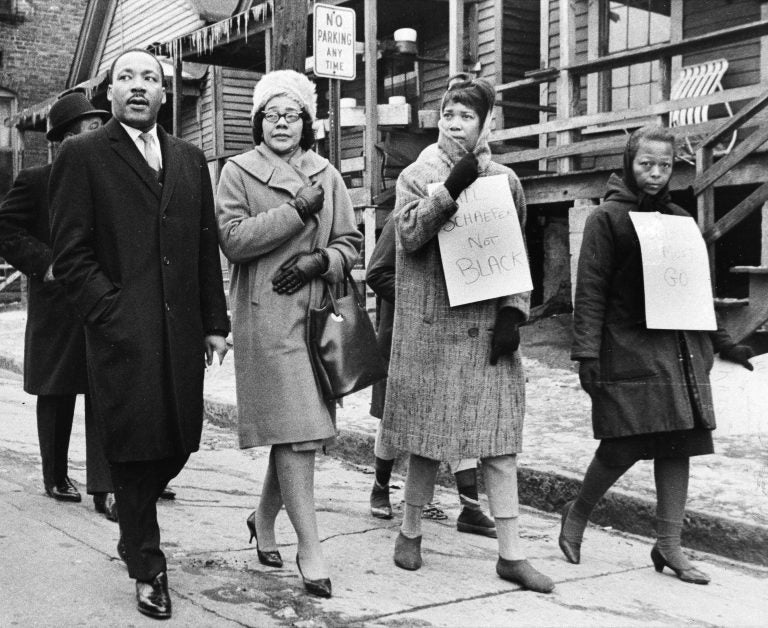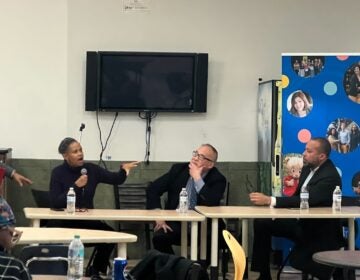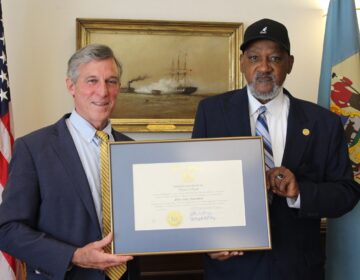Remembering ongoing work of women in the civil rights movement
"During the civil rights movement, or any other movement in this country, there are women of color pushing the moral conscience of our country to do better."

Dr. Martin Luther King, Jr., left, and his wife, Coretta Scott King, second from left, join pickets during a tour of an Atlanta slum area, Feb. 1, 1966, which King described as "appalling". The two women carrying signs were protesting the arrest of Hector Black, a volunteer who was charged with trespassing while handing out blankets at an apartment in the area. (AP Photo)
In observation of Women’s History Month and the 50th anniversary of the assassination of Dr. Martin Luther King Jr., NewCORE and PECO hosted a midday discussion on March 15 about the impact of women on the civil rights movement and its impact on them. The following statements, from women who spoke that afternoon, express their thoughts about how that theme resonated with them.
Valerie Gay, executive director, Art Sanctuary Philadelphia
I’ve been interested in the role women have played throughout history, particularly during the civil rights movement. In fact, Art Sanctuary’s arts education program focuses on the woman’s voice in the civil rights movement and teaches lessons from the movement through the arts in middle school English and history classes. Two of the pillars upon which we build our program are a book, “Pieces from the Past: Voices of Heroic Women in Civil Rights,” and a film, “Standing on my Sisters’ Shoulders,” both of which chronicle the lives and work of 12 mostly unsung women, black and white, in Mississippi who individually and collectively pushed the civil rights movement forward. With the exception of Fannie Lou Hamer, we haven’t heard of any of these women.
Pa. Rep. Donna Bullock, D-Philadelphia
I didn’t live through the civil rights movement, never experienced the days of black-only schools or water fountains marked “whites only.” However, I know that Dr. King’s work did not end with “I Have a Dream,” and the work of the many women on the ground advocating did not end because we passed the Civil Rights Act. The work must continue to address the contemporary civil rights issues that remain: unequal access to high-quality public education, income inequality, LGBTQ rights, immigrants’ rights, women’s rights, the school-to-prison pipeline, and Black Lives Matter.
And just like during the civil rights movement, or the labor movement, or any other movement in this country, there are women, and often women of color, behind it all, pushing the moral conscience of our country to do better. The legacies of Sojourner Truth, Rosa Parks, Coretta Scott King, Betty Shabazz, and Dorothy Height call on us to continue that work.
Dr. Carmen Febo-San Miguel, executive director, Taller Puertorriqueño
Growing up in Puerto Rico in the 1950s, it was generally accepted that there was no racism. When we compared ourselves to the U.S. and the practice of segregation or the Jim Crow laws, it was easy to internalize that justification. Yet, for me, the older I got, and the more I learned about the civil rights movement, primarily through the speeches and activism of Martin Luther King, the more aware I became.
I began to recognize the more subtle perhaps, but not less damaging, form of institutionalized racism I learned to recognize in Puerto Rican society, where very few people of color reached high levels of advancement whether on TV or in government. I saw this within my own family when, for example, a favorite aunt expressed evidence of her own prejudices referring to the darker skin of a cousin’s fiancé. Martin Luther King gave me the language and understanding to be able to see the value of a person separate from the color of their skin.
Sister Mary Scullion, co-founder, Project HOME
Many years ago, as we tried to articulate the essence of our mission at Project HOME, we began using the phrase “None of us are home until all of us are home.” We understood our work as being in the tradition of the civil rights movement, when it was frequently said by Dr. King, Fannie Lou Hammer, and others, that “none of us are free until all of us are free.”
While the immediate goals of the movement were to dismantle the Jim Crow system of legalized discrimination, its broader vision was to help America fulfill its ultimate promise of democracy and equal rights. We likewise believe that our work to end homelessness and poverty is part of a broader vision of healing our society, to bring about authentic “liberty and justice for all.”
The women and men of the civil rights struggle were asserting not just the constitutional rights, but also the inalienable dignity of each person, including those who had been relegated to the social margins. We too are ultimately asserting the dignity of each person and inviting people to come together in a beloved community in which we share our gifts and celebrate our common humanity.
—
Visit the NewCORE website for information about more discussions about the legacy of Martin Luther King.
WHYY is your source for fact-based, in-depth journalism and information. As a nonprofit organization, we rely on financial support from readers like you. Please give today.




